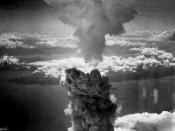"Language is the subject. It is the written form with which I've managed to keep the wolf from the door, and in diaries, my sanity. In spite of this, I consider the written word inferior to the spoken, and much of the frustration experienced by novelists is the awareness that whatever we manage to capture in even the most transcendent passages falls far short of the richness of life. Dialogue achieves its power in the dynamics of a fleeting moment of sight, sound, smell and touch."
-excerpt taken from Gloria Naylor's 'The Meanings of a Word'.
Words
The first sentence of this excerpt can have several interpretations, depending on which synonym of the word 'language' you choose to use. It could be her theme, her topic, her focus, the area that is under discussion. Language, for her, is the subject, the one she has used to support herself, the form she has employed to preserve her sanity.
In the first part of her third sentence, Naylor states that she considers the written word inferior to the spoken in spite of her second sentence; it is second rate, of lesser importance than the words actually verbalized. For her, written words do not hold as much power as those that are spoken; she, and novelists like her, are aware that even the most descriptive and moving of passages do not fully capture a 'fleeting moment of sight, sound, smell and touch' the way dialogue does. Naylor is of the opinion that one simple gesture, scene, scent or sound achieves what a thousand words describing them cannot, and this is frustrating to her, hence, her statement, '...I consider the written word inferior to the spoken'.
I disagree with this idea and argue that the written word is superior to the spoken.
There is a phrase that says that 'the pen is mightier than the sword'. Taken in literal terms, this phrase is a physical impossibility. Obviously, he who wields the bigger, stronger sword would triumph over he who brings a flimsy pen to the fight, unless by some slim chance it was some sort of new, unbreakable pen. What, then, is the meaning of this saying? The answer lies not in comparing the physical appearances of these two objects, but in considering what they can do. A sword, when used by a master of the blade, can kill maybe a dozen people. A pen can kill millions. It can condemn entire cities to death. In 1945, documents authorizing the use of the atomic bomb on Japan did just that; with the signatures of the cabinet and the President of the United States, Hiroshima and Nagasaki's fates were sealed. Consider also, that while a sword may be used to threaten a village or two, using a pen can set entire countries free, and decide the future of generations to come. The independence of British colonies, such as Zambia in 1964, was finalized by a stroke of a pen at the bottom of the declaration.
Think about it and you realize something: it's not the pen that's mightier than the sword. It is merely an instrument that is used to achieve an end. It is the words that are written using the pen which hold the power; it is the words on that document or bill or law or article that are mightier than the sword.
"I was jarred and shocked by the style, the clear, clean, sweeping sentences. Why did he write like that? And how did one write like that? I pictured the man as a raging demon, slashing with his pen, consumed with hate...I stood up trying to realize what reality lay behind the meaning of his words...this man was fighting, fighting with words...using words as a weapon, using them as one would use a club. Could words be weapons? Well, yes, for here they were."
-excerpt taken from Richard Wright's 'The Library card'
The above excerpt comes from a point in Wright's 'The Library Card' where the main character reacts strongly to a book he has just read. It is clear that the direct, cutting style of writing has affected him, and he hungers to know why and how someone could write like that. This leads him to pondering the hidden meaning behind the words, and the style of writing is such that he likens the author of the book to a demon, 'slashing with his pen'. In fact, he comes to the conclusion that words can be used as weapons and this supports the argument that written word is superior to the spoken. Like Mencken in 'The Library Card', we can use written words in the same way. They can be used to challenge set ways of thinking and attack prejudices and injustices without the violence of a war or the pettiness of a verbal argument. Using written words, arguments become free of emotional entanglements and are reduced to their simplest, most direct forms.
The spoken words that Naylor prefers would not be able to attain the same effect that a signed document would. A verbal agreement about an important matter, such as Independence of a country, would never hold up to the scrutiny of a legal proceeding. It would be far too easy for either party to change the wording of their verbal agreement ever so slightly to tip the scales in their favor or change the words all together, and in doing so, change the terms completely. There would be no way to prove that the agreement even took place.
The spoken word or word of mouth is an unreliable way to learn about historical events. Stories that are passed down from generation to generation stand a high risk of being distorted over time, and with so many storytellers, the original version will be lost within three or four generations. This is another way that the written word is superior to the spoken; written documentation ensures that the facts and details will always be there when we need them, exact and unchanged.
With so many variations and dialects of the English Language, it is almost impossible to find a daily word that was not been abbreviated or corrupted into slang. If it is not one or the other, then the context it is used in gives it a completely different meaning anyway. Take the word 'nigger' for example. Naylor shows us that depending on the words it is used with in speech, the word takes on multiple implications, thus increasing the chance of mistaking its meaning. Written words are clear cut, especially if written clearly, correctly and succinctly.
Words hold power over us all. While the spoken form does hold sway over every living being, words used in speech are like the beginnings of a thought and it is the written form that ultimately completes the idea.


